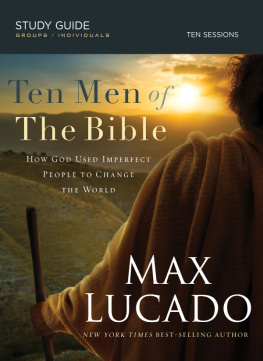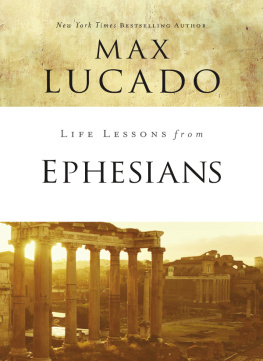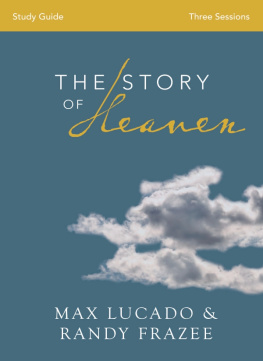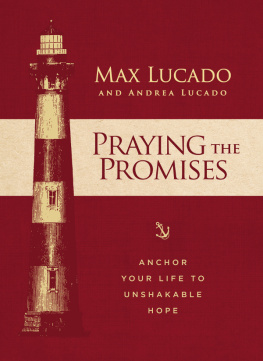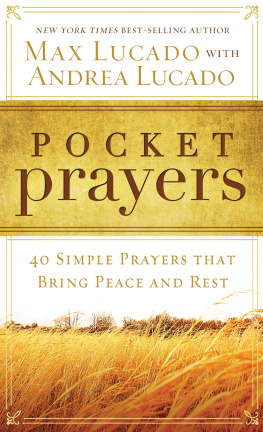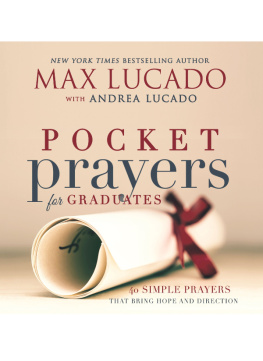Contents
Guide
Ebook Instructions
In this ebook edition, please use your devices note-taking function to record your thoughts wherever you see the bracketed instructions [Your Notes]. Use your devices highlighting function to record your response whenever you are asked to checkmark, circle, underline, or otherwise indicate your answer(s).
Information about External Hyperlinks in this eBook
Please note that footnotes in this ebook may contain hyperlinks to external websites as part of bibliographic citations. These hyperlinks have not been activated by the publisher, who cannot verify the accuracy of these links beyond the date of publication.
There is now no condemnation for those who are in Christ Jesus.
ROMANS 8:1
N ew York City.
If you want a view of the skyline, visit the Brooklyn Bridge.
For entertainment go to Broadway.
Looking for inspiration? Tour the Statue of Liberty.
Like to shop? The stores on Fifth Avenue await your credit card.
But if you want to be depressed, utterly overwhelmed, and absolutely distraught, take a cab to the corner of the Avenue of the Americas and West Forty-Fourth Street and spend a few moments in the presence of the US National Debt Clock. The sign is twenty-five feet wide, weighs fifteen hundred pounds, and uses 306 bulbs to constantly, mercilessly, endlessly declare the US debt and each familys share. The original clock wasnt built to run backward, but that feature has seldom been needed. Plans to install an updated model that can display some quadrillion dollars have been discussed. If debt were a tidal wave, according to this sign the undertow is going to suck us out to sea.
Im not an economist; Im a preacher. But my monetary experience has taught me this: when people owe more than they own, expect trouble.
Again, Im not an economist. Im a preacher, which may explain the odd question that occurred to me as I pondered the debt clock. What if heaven had one of these? A marquee that measured not our fiscal debt but our spiritual one? Scripture often refers to sin in financial terminology. Did Jesus not teach us to pray, Forgive us our debts (Matthew 6:12)? If sin is a debt, do you and I have a dot matrix trespass counter in heaven? Does it click at each infraction?
We lie. Click.
We gossip. Click.
We demand our way. Click.
We doze off while reading a Lucado book.
Click, click, click.
Talk about depressing. A financial liability is one matter, but a spiritual one? The debt of sin has a serious consequence. It separates us from God.
Your iniquities have separated
you from your God;
your sins have hidden his face from you,
so that he will not hear. (Isaiah 59:2)
The algebra of heaven reads something like this: heaven is a perfect place for perfect people, which leaves us in a perfect mess. According to heavens debt clock we owe more than we could ever repay. Every day brings more sin, more debt, and more questions like this one: Who will deliver me? (Romans 7:24 NKJV).
The realization of our moral debt sends some people into a frenzy of good works. Life becomes an unending quest to do enough, be better, accomplish more. A pursuit of piety. We attend church, tend to the sick, go on pilgrimages, and go on fasts. Yet deep within is the gnawing fear, What if having done all that, Ive not done enough?
Other people respond to the list not with activity but unbelief. They throw up their hands and walk away exasperated. No God would demand so much. He cant be pleased. He cant be satisfied. He must not exist. If he does exist, he is not worth knowing.
Two extremes. The legalist and the atheist. The worker desperate to impress God. The unbeliever convinced there is no God. Can you relate to either of the two? Do you know the weariness that comes from legalism? Do you know the loneliness that comes from atheism?
What do we do? Are despair and disbelief the only options?
No Condemnation
No one loved to answer that question more than the apostle Paul, who said, There is now no condemnation for those who are in Christ Jesus (Romans 8:1).
How could he say this? Had he not seen the debt we owe? Hed certainly seen his own. Paul entered the pages of Scripture as Saul, the self-professed Pharisee of all Pharisees and the most religious man in town. But all his scruples and law keeping hadnt made him a better person. He was bloodthirsty and angry, determined to extinguish anything and everyone Christian.
His attitude began to change on the road to Damascus. Thats when Jesus appeared to him in the desert, knocked him off his high horse, and left him sightless for three days. Paul could see only one direction: inward. And what he saw he did not like. He saw a narrow-minded tyrant. During his time of blindness God gave him a vision that a man named Ananias would restore his sight. So, when Ananias did, Paul got up and was baptized (Acts 9:18).
Within a few days he was preaching about Christ. Within a few years he was off on his first missionary journey. Within a couple of decades, he was writing the letters we still read today, each one of which makes the case for Christ and the cross.
We arent told when Paul realized the meaning of grace. Was it immediately on the Damascus road? Or gradually during the three-day darkness? Or after Ananias restored his sight? We arent told. But we know that Paul got grace. Or grace got Paul. Either way, he embraced the improbable offer that God would make us right with him through Jesus Christ. Pauls logic followed a simple outline:
Our debt is enough to sink us.
God loves us too much to leave us.
So, God has found a way to save us.
The Problem
Paul began his case for Christ by describing our problem: For all have sinned and fall short of the glory of God (Romans 3:23). We havent met the standard God set. We were intended to bear the nature of God. To speak, act, and behave the way he speaks, acts, and behaves. To love as he loves. To value what he values. To honor those he honors. This is the glorious standard God has set. We have failed to meet it. Jesus, on the other hand, succeeded. Christ never sinned (2 Corinthians 5:21 NLV).
What a remarkable statement! Not once did Jesus turn right when he was supposed to turn left. He never stayed silent when he was supposed to speak, or spoke when he was supposed to stay silent. He was tempted in every way, just as we areyet he did not sin (Hebrews 4:15). He was the image of God twenty-four hours a day, seven days a week.
When it comes to the standard, he is the standard. To be sinless is to be like Jesus.
But who can be?
We may have occasional moments of goodness and perform deeds of kindness, but who among us reflects the image of God all day every day? Paul couldnt find anyone. As it is written: There is no one righteous, not even one; there is no one who understands; there is no one who seeks God (Romans 3:1011).
People often bristle at the message of these verses. They take offense at its allegation. No one is righteous? No one seeks God? And then they produce their rsums of righteousness. They pay taxes. They love their families. They avoid addiction. They give to the poor. They seek justice for the oppressed. Compared to the rest of the world, they are good people.
Ah, but herein lies the problem. Our standard is not the rest of the world. Our standard is Christ. Compared to Christ, we, well... Can you hear the debt clock?
Sometime back I took up swimming for exercise. I didnt buy a Speedo, but I did buy some goggles, went to a pool, and gave it a go. Over the weeks I gradually progressed from a tadpole to a small frog. Im not much to look at, but I can get up and down the lane. In fact, I was beginning to feel pretty good about my progress.



